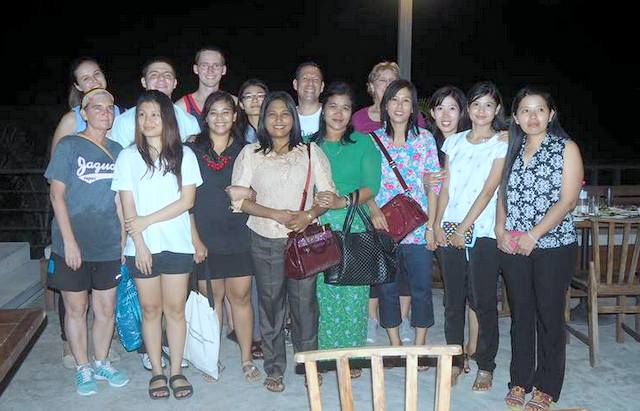It is hard to believe that, not only is the work over, in Chiang Mai, with Bridges Across Borders Southeast Asia Community Legal Education Initiative (BABSEACLE) and the Myanmar Law Teachers, but also that it went by so fast. I think that the time with those teachers was productive, and I look forward to seeing how such work impacts the development of their Clinical Legal Education (CLE) programs when they get home.
My focus of this placement was the planning and implementation of the “ideal” CLE community legal education teaching clinic –university seminars for law students and community site classes – and the development of appropriate lessons for community. An action plan for those seminars and site classes involved two separate planning documents, but the plans were interwoven throughout. We identified what has been done, what needs to be done, and what the expectations are for a CLE teaching clinic. I emphasized that teachers had the ability to convey the ideas for, and details of, a successful clinic, and that they should talk to their other law teachers and peers about the program, and should make changes and improvements in their plans.
The main concern they raised was how they could motivate law students to participate in a volunteer program. We talked about why they had volunteered for the CLE program and how they needed to offer incentives to the students, such as: interesting sessions; fun activities; and how to improve knowledge of law as well as the student’s skills and ethics/values. We agreed that the clinic program should eventually be accredited, and we discussed some ideas about this, with the understanding that it would take time and hard work to prove a clinic’s worth.
Although we did not develop a law student seminar syllabus, or a set of lessons for community classes, such a syllabus has to be developed, at the time that teachers make the initial decisions about what type of teaching clinic that they want, but we did talk about a possible semester course outline, with one class per week.
While in Chiang Mai, Thailand, at the BABSEACLE International Legal Studies Training Centre, they developed interactive lessons for The Wildflower Shelter Home and for Urban Lights Agency that can be used as demonstration lessons, until they know which sites they will be working with, and what the legal information needs are. These lessons are available to all, in a drop box, and the teachers have them in their personal files.
We also talked about the development of a mock trial teaching video. The teachers liked the idea and will work with BABSEACLE team members and volunteers, including Tracey, Dang and Emma to produce it. This will not be a video about mock trials, but rather a teaching aid for teachers to demonstrate the complete steps of the mock trial. It will feature video of the Inaugural Myanmar National CLE Mock Trial Event, in the Myanmar language, some role play by our staff, the Myanmar staff and teachers, and the Yangon University of Distance Education (YUDE) plans to use it for the Distance Learning Students.
These teachers have really improved in writing well-thought-out interactive lessons, although they still have some challenges with using open-ended questions or scenarios. This will take more experience in writing and teaching interactive lessons. They understand the difference between developing meaningful interactive lessons and “games” or “no knowledge” activities- e.g., “taking a stand” by the yes sign if a date is correct and by the no sign if it is incorrect.
They put the last Wildflower Home lesson together, and did a great job with the opening activity (focuser or energizer) that fit the content to the lesson. I will continue to work with them on lessons through the use of email and other means, as they develop them, and I hope that they will be able to provide model lessons for all Myanmar law teachers.
The concentrated placement program for the Myanmar teachers has so many good points and of course some challenges, but the good points clearly outweigh the challenges. One of the very many good points of the program is the learning English part, because it would be hard for them not to improve their English, while in Chiang Mai as this is the BABSEACLE operative language here. Hopefully, the BABSEACLE team, volunteerts staff and interns encouraged them, one-on-one, to speak even more English.
The time that the teachers spent with Harrison (Tim) Dickey, a long term volunteer lawyer with BABSEACLE, learning mock trial, was excellent. He is patient and methodical, and makes them speak up and try harder. I believe that they became more confident, and will be able do a great job with mock trials, when they get home. Another strong part of the program is social activities, like hiking, running races, buying tennis shoes, playing together and painting the volunteer house fence. They seemed to learn much from these activities, many of which I am unsure if they ever have done at home. This may even help them to avoid becoming introverted. These teachers are energetic, and really wanted to understand how to create and manage good CLE programs, to upon their return home. I hope that they will continue to network, with each other and with others, and that teamwork and collaboration won’t end when they leave. It would be a major plus, if the Myanmar CLE team plans activities that bring them all together, on a regular basis, in order to share their experiences and ideas, so that they may improve their efforts, going forward.
Thanks to all, for my grand experience, too. It is more valuable than you can imagine for me to learn so much about other countries, their educational systems and their cultures, when I work with CLE. I have enjoyed working with each of you, and truly hope that we will meet again, soon. Good luck to you, your programs and your plans!
By Elizabeth Chorak, ICIR for BABSEACLE

